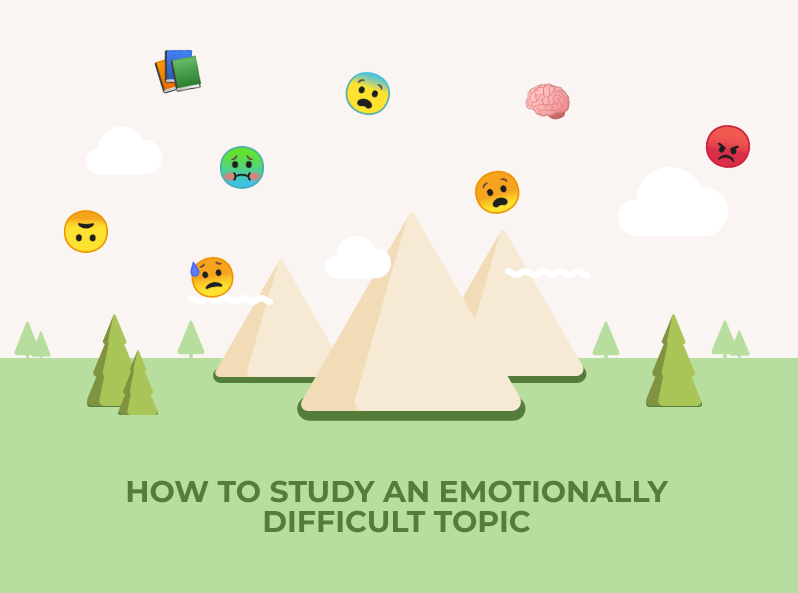
While we all agree that studying is difficult, there is another side of the struggle that often gets overlooked: the emotions brought up by our studies. Most of us come to university to pursue our goals and passions, but sometimes success isn’t as simple as studying hard. Learning about issues like racism, sexism, climate change, and health and illness, I’ve often found myself needing to spend more time on self-care than studying the issue itself.
It can be difficult to study a topic not only because it is academically challenging, but because it is emotionally challenging. I’ve found this a lonely experience within classrooms focused on tests and assignments, leaving little time for students to reconcile their anger, sadness, anxiety, or hope about the topic with their peers.
I asked five of my undergrad and graduate friends to share their experience and advice on how to study emotionally difficult topics, from climate change to nursing. The biggest thing I learned from these interviews is that you’re not alone. If you’re struggling with your emotions about a topic, chances are someone else is too.

Grace studies many controversial topics in nursing, from fetus viability and abortion to dying with dignity.
How do you experience emotionally difficult topics?
“You need to be a pillar for your patients, so you have to have a grounding in whatever people have gone through. Often things can conflict with your own personal feelings. Some patients and families want care withdrawn sooner than others, and it’s hard watching them make that decision.”

How do you manage your emotions in nursing?
“Managing your emotions takes a ton of practice. I find the biggest thing is acknowledging my emotions and finding a safe conversation space with my friends who are studying the same things. Identifying what you’re uncomfortable with is half the battle. While we talk about self-care techniques in nursing, I find most of my support comes from SU and student resources.”
What advice would you give other students studying emotionally difficult topics?
“Self-reflection becomes really important and identifying your own biases. Everyone is going to have opinions, and that is okay. Looking at why you have those opinions is an opportunity to study difficult topics without conflict. Making relationships with other studying the same topics is important- you’re not alone.”

Remy is writing her sociology undergraduate honors thesis on political spin and climate change policy.
What emotionally difficult topics do you study in sociology?
“Throughout my four years of my degree, I’ve been relatively able to compartmentalize the really intense things we learn in class and have the privilege to not think about it and, to a certain extent, leave it behind on campus. However, that changed when I started writing my thesis. I’ve spent an inordinate amount of time reading about how authoritative organizations manipulate the public into believing their narrative in the name of economic gain, all the while knowing the harm it causes, both environmentally and individually.”

How do you experience emotionally difficult topics?
“Reading about how the different forces in our current socio-economic system promote this corporate apathy is incredibly draining. It can be hard to see the good in people and I often find myself growing more and more cynical.”
What drives you to study this topic, despite its emotional tax?
“It’s times like this when it is so vital to actively search for the truth. Given the current political climate, I would argue that thinking critically and individually are two skills that have grown exponentially in value.”

Julia researches food insecurity in South Sudan for her sociology undergraduate honors thesis.
What emotionally difficult topics do you study in sociology?
“In the past few years I’ve had to research and write about some pretty horrific topics. Namely, genocides, water and food insecurity, historical and contemporary racism — you name it, I’ve written on it.”
How do you experience emotionally difficult topics?
“To be completely honest, I was really angry for a while — angry about the atrocities of the world that not enough people seemed to care about; angry, in a way, that I was privileged to be able to sit at home on a computer, researching a humanitarian crisis without ever having to experience famine, water insecurity, genocide, or land loss. When I see people around me — even my close friends — not caring about who had to suffer to, say, make their shirt, it totally brings me down. I’m not going to lie; I’ve definitely lost my faith in humanity several times.”

What have you learned through studying these topics?
“I’ve found it helpful to surround myself with like-minded people who care about global issues. Also, I actively seek out good news. I go out of my way to read some good news about what’s happening around the world when I’m feeling down. Most importantly, I think it’s crucial to recognize and honor your own pain. Sometimes I feel guilty for caring about the ‘first world problems’ that I experience, which only makes me feel worse in the end. I can recognize that things could be much worse, but still know it’s okay to feel however I am feeling.”
How have your studies transformed who you are outside of class?
“Alongside my anger came guilt, which turned out to be a really great impetus for turning me into a proactive person who confronts, rather than avoids, injustices.”

Jessie’s PhD research on “Teaching at the End of the World” investigates how fascism and economic precarity influence the educational systems which shape our ideas of the future amidst climate change and the Anthropocene.
How do you experience emotionally difficult topics?
“When I get embarrassed or don’t know what to do with my feelings, I get literally choked up. Like, you know when you feel something rising and then think, “Oh no! I can’t go there!” or it might literally explode out of your face? Maybe if feelings were more normalized, they wouldn’t become so powerful since we’d know we can make it through the experience.”
What stops students from being able to ask difficult questions?
“People are busy, especially students, and there’s very material and financial limits and in some ways it’s a privilege to have the time to think about difficult topics. Capitalism makes it hard to organize in the face of these issues because we spend so much time competing to make a living so we can eat and sleep. And so then I’m like, okay, how do schools play a role in that? How could schools actually be a space where we start talking about things together, not just so we can be tested on them.”
What role do youth have in addressing difficult topics?
“Sometimes there’s this idea that young people either need to be protected from the world, or that they’re the hope for the future. So we’re either trying to save them or thinking they’re going to save us instead of thinking about bigger things like collectivity.”

How can we start to address emotionally difficult topics in classrooms?
“When I’m teaching, I often get people asking me “how can we fix it” or “what do I do.” My first instinct is that we need to move away from this solutionist thinking, which stops us from taking a moment to understand what the problem is in the first place. Secondly, we need to start working collectively- which is the opposite of what we’re taught to do in a competitive system. No one person or theory is going to produce the solution. Finally, we need to escape the trap of purity politics. Whether we’re studying something or buying something at the grocery store, there’s this real fear we’re doing it wrong. But this is a distraction I think we often use within ourselves- like we kind of give up (speaking for myself) since we feel like there’s no point in trying if we’re not perfect. I can’t help but think something else is possible.”
Do emotions have a place in academics?
“Oh yeah. We’ve learned from feminist, anti-racist, and de-colonial studies that you can’t separate your emotions. It’s not just about coming up with better technologies but actually thinking with every ounce of our bodies, which is not even our being but all these other critters and things that make up who we are.”

Josh has studied tough topics in psychology and women and gender studies, including lobotomies and stalking.
How do you experience emotionally difficult topics?
“It’s hard when the things you study affect those you know. When I was researching stalking, I shared my work with one of my female classmates only to learn she had experienced stalking herself.”
What advice do you give yourself while studying emotionally difficult topics?
“I tell myself that I have to persevere, and the fruits of my labour will be equivalent to what I put in, though my mum tells me she could never do what I do.”
What drives you to study women and gender studies?
“I’ve gotten some weird looks from people when they hear I’m a cis-gender man studying women and gender studies, but I do it for the pursuit of knowledge and interest.”
